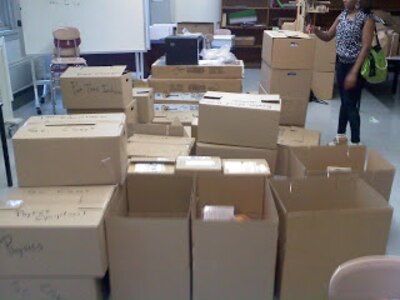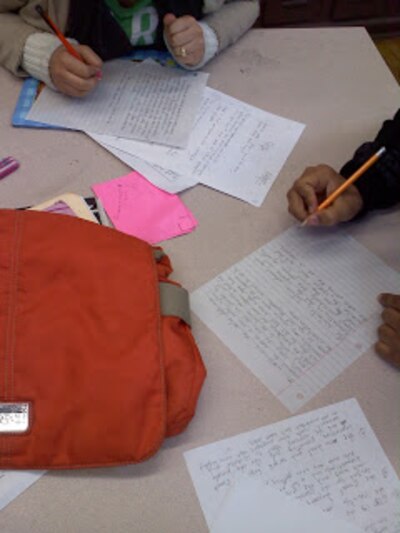My whole life I’ve known I wanted to be a teacher, and for most of it I’ve known I have a passion for working with students who face an uphill climb to success. Six years ago, I started my teaching career in Washington, D.C., and moved to New York shortly afterward. By the time I left New York in 2011 for the Seattle area, where I’m teaching now, my understanding of the teaching profession and of public schools had been turned on its head. In a series of posts, I will share some of my experiences. My goal is to inform people who have never worked in schools — including those who make decisions about how schools should work — and to give the public a glimpse into the challenges committed teachers face on a daily basis.
The assistant principal’s office is crammed into the corner of the second floor of the nearly 90-year-old James Monroe Building in the Soundview neighborhood of the Bronx. Behind me is the door into the hallway, an opening into the dizzying array of students from different schools and languages from different countries. Before me sits the instructional coach our administration hired to help us make sense of outcomes-based teaching.

I sit in tennis shoes, jeans, a flannel shirt, and keys hanging from my three-year-old caribiner attached to my right belt loop. My unshaven face pushes against my right hand pushes against my elbow pushes against the desk frustrated. Not frustrated because of my missed planning period, nor the student I chased down for stealing breakfast that morning. Not because stacks of papers loom over us on both sides of the desk we’re working at like Manhattan skyscrapers, nor because boxes of books and newly ordered materials touch nearly every floor tile, making the movement from one corner of the office to another a journey four times longer than it would otherwise take. Frustrated for a different reason.
Peggy and I stare at the plan I’ve created. “These outcomes are really nice, very impressive. I’m just worried you may be overestimating the students’ ability levels. This looks like something you’d do in freshman-level college course.”
How would you know if I’m overestimating their ability? They’re my students. … is my thought, but only fleeting. A brief ego shield that quickly melts away under the heat of reality.
It’s so easy to fantasize about teaching the really interesting things about history and social studies that require the background knowledge they don’t yet have to really engage in, to expose them to rigorous standards and high expectations that you know you don’t have time uphold.
My assistant principal looks at my eyes and asks how much sleep I got. “Enough,” I say, knowing it was at least twice as much as she got.

In a rush to cover everything at the end of the year in a meaningful way, I had created jumbo outcomes for what traditionally gets taught in history between 1870-1945 that every student would be responsible for.
Explain how liberal ideas of democracy developed during European imperialism, World War I, the Great Depression, and World War II.
And then I had created smaller, more manageable outcomes that only some students would be responsible for. In my teacher Narnia, students would then provide information to the whole class on their assigned outcomes.
Analyze European motives for African and Asian imperialism.
In a way, I wanted to scream, “WHY CAN’T I TEACH THIS STUFF!!! We’re supposed to be holding them to high expectations, right? We know that when we hold students to high expectations, they’ll rise to them? Isn’t that what we all learn in teacher school? The stuff I’m trying to teach isn’t even really that advanced!” But I knew every bit as well as Peggy why these outcomes were overly ambitious.
“Do you really think you can get your students to do this?”
“I KNOW every single one of them can do this, and I KNOW I could get them to do it. (In Narnia I could.) I’m just not sure I have the time and resources to help them get there….”
My assistant principal reviewing new teacher resumes on her blackberry now. Peggy slowly and confidently nods at me. Her eyes say this was the conclusion she was hoping I’d come to when she began her line of questioning. “That’s something you’ll have to consider.”
I put my backpack on and leave the office with the outcomes I’d spent an entire weekend creating.

As I walk down the stairs to my classroom, a war wages in my mind that disrupts my emotions. I’m reminded we don’t have enough rooms so that I can have a quiet last ten minutes of my planning period, so I instead choose to join the Spanish class. On one side of my head fights the six-year-old expectations for what I’d been led to believe was my immense capacity to educate students and change lives coupled with an innate lifelong idealism. On the other, the fresh lessons of the past six years learned battling student apathy, poverty, and the staggeringly negative effects of adult incompetence and ego.
As Spanish class ends and I begin digging through my backpack for the work I’d planned for my ELLs (primarily recently-arrived Dominicans), one of my students asks me if I want to collect the homework from last night. “Oh my gosh, yes! Thank you for reminding me. Please, everyone give me the homework from last night.”
Most students look at each other and snicker. One with a big smile on his face: “Come on, mister. You know we don’t do homework.”
Something I’ll have to consider.
About our First Person series:
First Person is where Chalkbeat features personal essays by educators, students, parents, and others trying to improve public education. Read our submission guidelines here.
